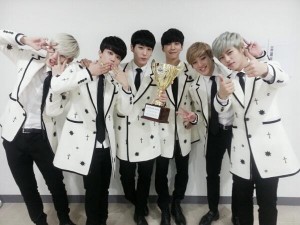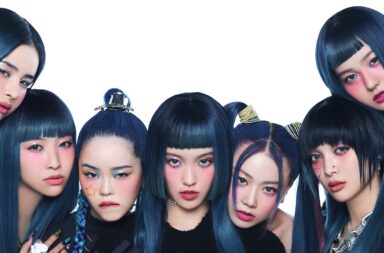 In the last couple of years, the boom in idol lawsuits and group break-ups has been difficult for many fans to cope with. Not only is it hard to lose a favorite group, it’s hard to acknowledge that there is so much wrong with an industry we support.
In the last couple of years, the boom in idol lawsuits and group break-ups has been difficult for many fans to cope with. Not only is it hard to lose a favorite group, it’s hard to acknowledge that there is so much wrong with an industry we support.
Recently, SM Entertainment has been at the top of the list with Sulli officially leaving f(x), Jessica officially leaving SM and Tao finally dishing on all that went down with Exo. But they’re not the only ones in trouble — Stardom Entertainment is living up to their reputation of being shady with both Evol and Topp Dogg members filing lawsuits.
And on the flip side, we have B.A.P returning to their company, despite months of conflict. I think we all expected them to pull a Block B, so the quiet re-integration into TS Entertainment was a bit shocking.
In lieu of these events, our question this week is: When should an idol just call it quits with K-pop? How much is “too much” when it comes to this industry? And do you think here’s hope for group’s like B.A.P and ZE:A who have “worked things out” with their companies?
Cjontai: Despite the illusion of glamour most people have in regards to celebrity, it is a cesspool of daily B.S. I’m not even talking about just Korean idols; American celebrities deal with crazy situations also. The difference is how each culture handles scandals.
In K-pop, the smallest infraction, like dating openly, can result in a loss of fans and revenue. That’s why they have these dating bans, which would’ve been enough for me to quit personally. You’re telling me I’m going to be surrounded by these hot guys backstage, and I’m not allowed to flirt for a number? They are adults with hormones! Why not tell just them to stop eating while you’re at it?
Oh wait, they do tell them that ALL THE TIME. I’ve seen these idols up close in person, and they’re skinny! And what scares the crap out of me is they basically brag about skipping meals, not realizing how dangerous it is to put your body through intense stress.
 Then there’s the sasaeng culture that gives offenses, such as poisoning idols or breaking into their dorms, a slap on the wrist. At least in the U.S., celebrities are protected by anti-stalking laws and can file restraining orders. Absolutely no one finds it normal to stalk someone here.
Then there’s the sasaeng culture that gives offenses, such as poisoning idols or breaking into their dorms, a slap on the wrist. At least in the U.S., celebrities are protected by anti-stalking laws and can file restraining orders. Absolutely no one finds it normal to stalk someone here.
But the ones most responsible for a majority of the illogical crap idols must endure are their companies. They control everything from who they date to what they eat. They trick them into signing these unfair contracts, and if anyone has the nerve to request nullification, they act as if the idols blindsided them. It’s so maddening that I’m shocked anyone still wants to even become an idol.
Camiele: I agree 100% with Cjontai’s assessment of the idol industry. Unfortunately, as “modern” as the imagery tries to be, the idol industry is part of South Korea’s pop culture, with heavy emphasis on the “culture” aspect. I think it goes doubly for idols because, as is part in parcel with this idea of celebrity, most people believe no matter what happens to said celebrity, he/she/they should be grateful, should expect to suffer any type of infraction against general human decency, and pretty much has it coming to them. Anyone who dares to so much as question any of this for the sake of preserving their health, their ability to do what they actually do, and just for the sake of human decency and self-respect, they’re basically blackballed. I, too, like Cjontai wonder why I persist in this genre when the industry is so riddled with hypocrisy.
Because of the general griminess of the industry, including recruiting kids who are 11, 12, 13 years old and basically conning them into essentially sign over their lives, idols should basically start getting their own legal representation when they hit the legal age to do so, and then if (and inevitably when) they do find out just how murky these contracts are, they should demand changes. If those demands aren’t even considered or a compromise can’t be reached they should split. However, because of the fear of never being able to appear on broadcasts in their own damn country simply because they did stand up for their rights, or being sued by their own company because they’ve managed to become successful, or even being kicked out of your group for pursuing a fallback plan, doing so is certainly too much of a risk than simply riding it out. It’s not a question of should, really. It’s more a question of if the idol is able to call it quits without fear of serious repercussion.
 People still want to become idols for the same exact reason people stay in the music industry in general: the appeal of that stardom, the money, the ability to do what you love and get paid for it. To some extent, there could even be pressure from home to make something of themselves in a big way… It leads kids to seek out the companies they know make the biggest impact and will give them the biggest opportunity at all the things they want. In their mind, and from what I can see just from netizen reaction, a “little sacrifice” (food, sleep, human interaction with anyone besides fans and bandmates, etc.) is well worth it in the end. Kids, no matter what the warning signs are, always believe they’re invincible and can handle anything. It’s not until they realize what’s being asked of them that they’re forced to make the choice between leaving and facing the repercussions, or going on until there’s nothing left of them.
People still want to become idols for the same exact reason people stay in the music industry in general: the appeal of that stardom, the money, the ability to do what you love and get paid for it. To some extent, there could even be pressure from home to make something of themselves in a big way… It leads kids to seek out the companies they know make the biggest impact and will give them the biggest opportunity at all the things they want. In their mind, and from what I can see just from netizen reaction, a “little sacrifice” (food, sleep, human interaction with anyone besides fans and bandmates, etc.) is well worth it in the end. Kids, no matter what the warning signs are, always believe they’re invincible and can handle anything. It’s not until they realize what’s being asked of them that they’re forced to make the choice between leaving and facing the repercussions, or going on until there’s nothing left of them.
Mark: I think it’s easy to look at it from a personal perspective where I’m sure most of us would have never even considered entering the industry based on what we know. But that’s why we aren’t idols. In fact, idols represent a very small percentage of the even the Korean population. They are the few and the strong who have the mental and physical prowess to endure the trainee process and the predicament of living life as an idol. Who are we to tell these few determined individuals that what they’ve worked for their whole life isn’t right or isn’t worth the effort?
I think idols should call it quits when they feel that the time is right without the ridicule of fans and their company convincing them otherwise. Furthermore, I don’t see the harm of groups like B.A.P or Kara who return to their company after filing a lawsuit. If whatever they worked out was disagreeable, I’m sure the members would have preferred to walk since they were already in the situation to do so anyways. We as fans should be supportive of idols whether they elect to leave or stay with their company. We should trust that they as individuals have the common sense to do what’s right for them.
 I like how this discussion is evolving into one about how we as consumers live with ourselves given all that we know about the less than spectacular working conditions of the industry. The reason we put up with these injustices may simply be because we enjoy the finished product too much. Similarly, we know it’s bad for our long term health to eat meat, not to mention the inhumane treatment of animals and the environmental harm, but we eat it anyways because it tastes so good! Personally, I find no contradiction in this framework of thought as long as we acknowledge that our consumer preferences don’t always align with our moral foundation. It’s just a part of the world we live in.
I like how this discussion is evolving into one about how we as consumers live with ourselves given all that we know about the less than spectacular working conditions of the industry. The reason we put up with these injustices may simply be because we enjoy the finished product too much. Similarly, we know it’s bad for our long term health to eat meat, not to mention the inhumane treatment of animals and the environmental harm, but we eat it anyways because it tastes so good! Personally, I find no contradiction in this framework of thought as long as we acknowledge that our consumer preferences don’t always align with our moral foundation. It’s just a part of the world we live in.
Andy: Perhaps the internal contradiction as fans come from some sort of partially true delusion that our money and support goes toward the artists themselves. From lawsuits, we know that multiple (if not most) companies take the largest chunk of our money. However, fans hold on to the little sliver of hope that the artists get at least a little bit (B.A.P being an example where this doesn’t happen).
As to artists rejoining a label after filing a lawsuit, it’s fine as long as they are getting a better deal. I would think the artists are smart enough to not go back to the same bad treatment as before. And agencies would be stupid to not offer some mollification and betterment since they’ve already faced public backlash. With of course the exception of agencies like SM Entertainment, which seem to get away with most things unless it’s the holy beings that are JYJ dragging them into court.
As Mark said, we look at these things from a personal perspective. That being said, if an artist feels they are being malnourished, abused, humiliated, truly held back and/or impoverished by an agency that promised them something different, then the artist should leave. They should do so without the masses belittling their decisions, as well. After all, as K-pop fans, aren’t we supposed to stanning the artists and not their agencies?
 Camiele: To respond in part to Mark, it isn’t about telling them what they want or what they’ve worked for is wrong. Actually it’s quite the contrary. What they’ve worked so hard for, given up their lives for, is absolutely right. The problem is they’re not getting it and have sacrificed so much of themselves to either sit around and fester until they’re needed to make the company look good, or they’re finally able to make music only to either disband or be reshaped because of any number of reasons (mostly not making the company enough of a profit) or not get anything out of it.
Camiele: To respond in part to Mark, it isn’t about telling them what they want or what they’ve worked for is wrong. Actually it’s quite the contrary. What they’ve worked so hard for, given up their lives for, is absolutely right. The problem is they’re not getting it and have sacrificed so much of themselves to either sit around and fester until they’re needed to make the company look good, or they’re finally able to make music only to either disband or be reshaped because of any number of reasons (mostly not making the company enough of a profit) or not get anything out of it.
In the end we all know companies rarely care about music. It’s about profit. And if the music’s good, both the company and most importantly the artists should absolutely reap the monetary benefits and accolades. However, there’s a gross disproportion of those benefits going to the company as opposed to the artist who’s suffered to get what they deserve. And as human beings who are interested in the music and the artists, to see them suffer and still put up with it because circumstances dictate they have no better options is difficult to stomach.
I agree any artist, idol or otherwise, should only call it quits if they don’t want to do it anymore. But in a situation in which there’s obvious abuse from a company to its artists, it’s pertinent the idol leave for their health and sanity. If they want to stay and tough it out for whatever reason, that’s certainly their choice, and we’ll never know even a fraction of their reasoning for staying or leaving. We as fans see less than half of what actually goes on unless an artist decides to open up about it. So we absolutely have no room to judge the artist, which I don’t believe is what’s happening here. But we can be concerned for them because of the inevitability of their bodies and/or their minds breaking down. On the surface it may seem they have some mythical strength that we don’t. But anyone has strength to endure something if they believe in the end they’ll get what’s promised to them. But even with the mental fortitude of a mountain, the body will and does break down. They’re just young enough now where it will take a couple more years than someone not trained for it.
 Cjontai: In my earlier statement, I wasn’t questioning why we as fans support K-pop. I was addressing why idols continue putting themselves through this rigorous process in the first place, but that’s where I give extra side eye to these companies.
Cjontai: In my earlier statement, I wasn’t questioning why we as fans support K-pop. I was addressing why idols continue putting themselves through this rigorous process in the first place, but that’s where I give extra side eye to these companies.
While Mark brought up good points about granting the idols the freedom to quit if things get too hard, we’ve also seen the ugly consequences of what happens when they do. The ideal situation would be what happened with U-kiss, in which the members who wished to quit were relieved from their contracts with little opposition. No one was labeled a traitor through media play, and fans accepted the departures of the former members because of how quietly things were resolved.
Unfortunately, things didn’t run so smoothly for Kris, Luhan, Tao and Jessica. Jessica got lucky because she was already booted from SNSD before officially ending things with SM. Technically, SM dumped her first, so they didn’t have any reason to drag out the nullification process.
As for Kris, Luhan and Tao, they couldn’t take the harsh conditions any more and chose to jump ship before it sank. Now their lawyers are going through these endless negotiations, and SM is not budging an inch. Just like with JYJ, they intend to make an example of them through the law and media play.
That’s where I take the most issue in this matter. Ideally, if these companies could hear out the idols fairly and give them respect, then less of these instances would occur. You’d have more quitting because they were simply tired of idol life as opposed to leaving due to mistreatment by their companies.
(YouTube, Images via SM Entertainment, C-JeS Entertainment, Beauty +, NH Media, DSP Media and Twitter)


